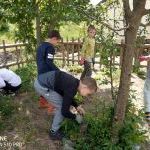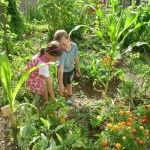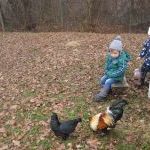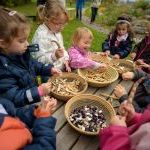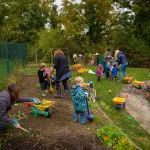School Eco Gardens
The School eco gardens project offers professional support for a network of schools, early years settings and universities who wish to set up an ecologically friendly garden. The main goal of the project is to enable children to produce their own food in harmony with nature, whilst allowing children to get to know about ecological gardening. Through the project, they experience the holistic and sustainable qualities of ecological friendly food. Ecological gardening also provides opportunities for making friends, learning about relationships, work and responsibilities.
Website
Useful links
The Royal Society for the Protection of Birds (RSPB) have a range of top tips for eco-gardening
Country
Media
Photos: Petelin A.., Vesel T.
* TOP TIP *
'Work with the whole school community to set up your garden. Ask local businesses for donations and ask parents to help with its construction.'
How is the project linked to climate change & sustainability?
Through the eco gardens project, children get to experience the rewards of fresh produce and growing their own food. They connect to nature and learn about ecological and permaculture ways of growing and how these methods don´t contribute to climate change. Because of the positive experiences that children have when working in the eco gardens, it´s more probable that children will have continue with these methods of gardening when they get older and will prioritise the ecological products that don´t contribute to climate change.
Who is involved?
Pupils, teachers, parents and grandparents all take part in the eco gardens project.
How are the participants involved?
Once a school has decided to take part, they receive support from professional mentors from the School Eco Gardens project. These mentors help participants to come up with a proper plan for the garden and its implementation. All of the work is planned with children in mind and the mentors guide teachers on how to use the eco gardesn as an intercurricular learning tool. Children learn about relationships, team working and work ethics. Children also learn about nature, seasonality and about the circle of life. The School Eco garden association organises educational activities, workshops and events for the whole network of participants, where they can also exchange their ideas. Teachers can access learning materials on the project's website.
Key considerations
- Do you have a place to set up a garden?
- Do you have easy access to water for watering the garden and for washing hands? Do you have compost? What about the shed for garden tools? What else do you need to support your work on garden?
- Is your headmaster supporting the idea about garden? Which people at the school will be in charge of the garden and its activities?
- How will you finance all your expenses? Will you collect paper, electronic devices, will you ask for sponsorship?
- You can collect a lot of materials from parents – maybe they already have some extra materials they don´t need. Why not asking them and put together a list of things you need.
- Think about who will work on the garden during the holidays. Can you ask parents or grandparents?
- How will you implement garden into a curricular activities?

